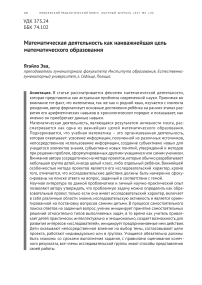Mathematical activity as one of the most important aims of mathematical education
Автор: Jagietto Ewa
Журнал: Поволжский педагогический поиск @journal-ppp-ulspu
Рубрика: Анализ практик
Статья в выпуске: 1 (19), 2017 года.
Бесплатный доступ
The article considers defining mathematical activity as the relevant issue of science. Taking into consideration the fact that mathematics, just like the mother tongue, is taught from the time of birth, the author provides the tabulate showing the child's fundamental achievements at the early phases of the development of his arithmetical skills, which provides the consecutive stages of the child's education in a chronological way and shows the way how he gains his skills. Mathematical activity, being the activity of the mind typical of the mathematician, is one of the most important aims of mathematical education. It should be underlined that learning mathematics is the organized activity which covers: taking over and assimilating information obtained from various sources, using the information directly, creating subjectively new for the learner elements of knowledge, subjectively new concepts, statements and methods while solving problems formulated by others or the learner himself. The author's attention is focused on the issue of projects, which are usually worked out by a small group of children from a class, sometimes it is the whole class and sometimes an individual child. The fundamental feature of a project is its research character and in addition research actions should be intentionally focused on finding the answer to the question given regarding the topic. On the basis of scientific literature and some scientific experience it can be stated that the task can be defined as an educational project only if it has a research character, it includes various areas of education, research activeness is focused on asking questions by children themselves and trying to find the answer on their own, it initiates unaided making decisions concerning types of executed tasks and types of organized episodes, it engages children practically, intellectually and emotionally, it creates the possibility for developing the interests of ‘the researchers', actions taken provide intellectual vigour, children have their influence on choosing the topic and they accept the project aims, children work together or in groups, children are familiar with deadlines of the task execution, it involves with its rage outdoor activities even in initial stages, it integrates educational institution with a child's home and local environment, the participants are familiar with the rules of assessment, all of the research group members know the ways of presenting their work. The project structure can be divided into five stages: initiating of the project (choosing the topic), working out the plan of the project, carrying out the project (taking up the research activeness), finishing the project and assessing it. This may be regarded as a great mathematical activity when correctly introduced into educational process.
Mathematical activity, mathematics, educational project
Короткий адрес: https://sciup.org/14219750
IDR: 14219750
Список литературы Mathematical activity as one of the most important aims of mathematical education
- Badura-Strzelczyk G. Help Me Count It Myself. MATHEMATICS According to Maria Montessori from the Age of Three up to the Third Class of Primary School. Opole: NOWIK, 2008.
- Gruszczyk-Kolczynska E. Children with Specific Difficulties in Learning Mathematics. Warsaw: WSiP, 1992.
- Gruszczyk-Kolczynska E., Zielinsk E. Mathematics for Children. A book for Parents and Teachers. Warsaw: WSiP, 1997.
- Filip J., Rams T. A Child in the World of Mathematics. Cracow: Impuls, 2000.
- Karbowniczek J. Directions of Changes in Professional Functioning of the Early School Education Teachers, (a report after research carried out on the area of the Swietokrzyskie Province). In: A Teacher and a Pupil in their Common Educational Space (edit.) Grelowska W., Karbowniczek J. Czestochowa: AJD, 2005.
- Karbowniczek J. Mathematical Games and Plays on Holiday//School Life. 2006. № 6.
- Katz L.G. The project approach, Champaign, IL, 1994. Available at: URL: http://files.eric.ed.gov/fulltext/ED368509.pdf
- Klim-Klimaszewska A. Nursery School Pedagogy. The New Programme Basis. Warsaw: ERICA, 2010.
- Krygowska Z.A. To Understand the Error in Mathematics//Didactics of Mathematics. 1989. № 10.
- Krygowska Z.A. The Outline of Teaching Mathematics, part 1,2,3. Warsaw: WSiP, 1979.
- Oszwa U. The Development and Assessment of Mathematical Skills Amongst 6-Year-Old Children. Warsaw: Methodical Centre of Psychological and Pedagogical Help, 2006.
- Russell B.The Introduction to the Philosophy of Mathematics. Warsaw: Aletheia Foundation, Znamierowski Cz. (translation). 2003.
- Siwek H. Didactics of Mathematics. Theories and Usage in School Mathematics. Warsaw: WSiP, 2005.


